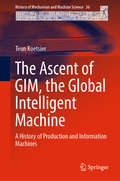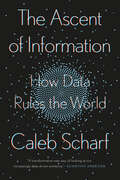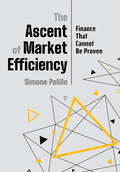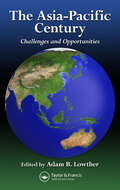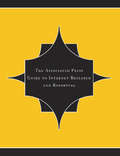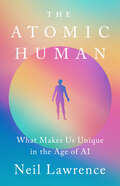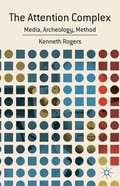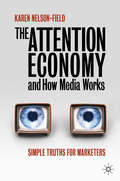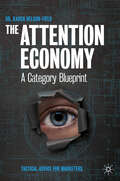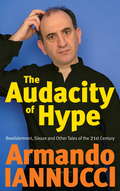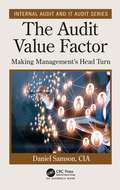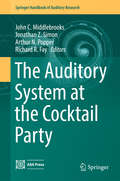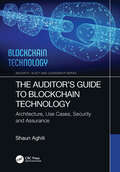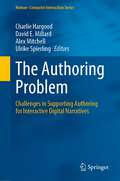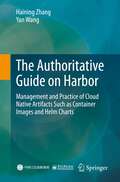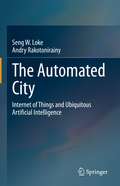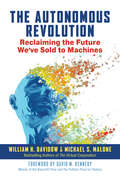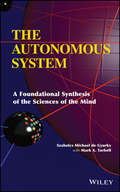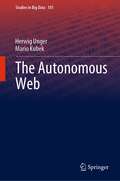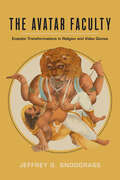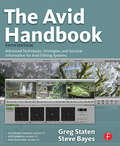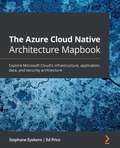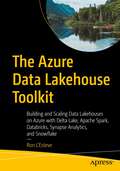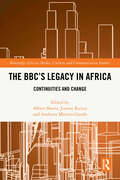- Table View
- List View
The Ascent of GIM, the Global Intelligent Machine: A History of Production and Information Machines (History of Mechanism and Machine Science #36)
by Teun KoetsierIn the concluding chapters of this book the author introduces GIM, the Global Intelligent Machine. GIM is a huge global hybrid machine, a combination of production machinery, information machinery and mechanized networks. In the future it may very well encompass all machinery on the globe. The author discusses the development of machines from the Stone Age until the present and pays particular attention to the rise of the science of machines and the development of the relationship between science and technology. The first production and information tools were invented in the Stone Age. In the Agricultural empires tools and machinery became more complex. During and after the Industrial Revolution the pace of innovation accelerated. In the 20th century the mechanization of production, information processing and networks became increasingly sophisticated. GIM is the culmination of this development. GIM is no science fiction. GIM exists and is growing and getting smarter and smarter. Individuals and institutions are trying to control parts of this giant global robot. By looking at its history and by putting GIM in the context of the current developments, this book seeks to reach a fuller understanding of this phenomenon.
The Ascent of Information: Books, Bits, Genes, Machines, and Life's Unending Algorithm
by Caleb ScharfYour information has a life of its own, and it&’s using you to get what it wants.One of the most peculiar and possibly unique features of humans is the vast amount of information we carry outside our biological selves. But in our rush to build the infrastructure for the 20 quintillion bits we create every day, we&’ve failed to ask exactly why we&’re expending ever-increasing amounts of energy, resources, and human effort to maintain all this data.Drawing on deep ideas and frontier thinking in evolutionary biology, computer science, information theory, and astrobiology, Caleb Scharf argues that information is, in a very real sense, alive. All the data we create—all of our emails, tweets, selfies, A.I.-generated text and funny cat videos—amounts to an aggregate lifeform. It has goals and needs. It can control our behavior and influence our well-being. And it&’s an organism that has evolved right alongside us.This symbiotic relationship with information offers a startling new lens for looking at the world. Data isn&’t just something we produce; it&’s the reason we exist. This powerful idea has the potential to upend the way we think about our technology, our role as humans, and the fundamental nature of life. The Ascent of Information offers a humbling vision of a universe built of and for information. Scharf explores how our relationship with data will affect our ongoing evolution as a species. Understanding this relationship will be crucial to preventing our data from becoming more of a burden than an asset, and to preserving the possibility of a human future.
The Ascent of Market Efficiency: Finance That Cannot Be Proven
by Simone PolilloThe Ascent of Market Efficiency weaves together historical narrative and quantitative bibliometric data to detail the path financial economists took in order to form one of the central theories of financial economics—the influential efficient-market hypothesis—which states that the behavior of financial markets is unpredictable.As the notorious quip goes, a blindfolded monkey would do better than a group of experts in selecting a portfolio of securities, simply by throwing darts at the financial pages of a newspaper. How did such a hypothesis come to be so influential in the field of financial economics? How did financial economists turn a lack of evidence about systematic patterns in the behavior of financial markets into a foundational approach to the study of finance?Each chapter in Simone Polillo's fascinating meld of economics, science, and sociology focuses on these questions, as well as on collaborative academic networks, and on the values and affects that kept the networks together as they struggled to define what the new field of financial economics should be about. In doing so, he introduces a new dimension—data analysis—to our understanding of the ways knowledge advances.There are patterns in the ways knowledge is produced, and The Ascent of Market Efficiency helps us make sense of these patterns by providing a general framework that can be applied equally to other social and human sciences.
The Asia-Pacific Century: Challenges and Opportunities
by Adam B. LowtherWhen Secretary of State Hillary Clinton published "America's Pacific Century" in Foreign Policy magazine in November 2011, the administration was clearly indicating to domestic and international audiences that the United States is beginning a pivot toward the Asia-Pacific. Clinton's article served as a spark for renewed interest in the nation's Asi
The Associated Press Guide To Internet Research And Reporting
by Frank BassFrom the editors at the world-renowned Associated Press, a guide to research, writing style, and reporting using the Internet
The Atomic Human: What Makes Us Unique in the Age of AI
by Neil D. LawrenceFrom a renowned computer scientist, this book seeks the distinctive human quality that will prevail against artificial intelligence. If artificial intelligence takes over decision-making what, then, is unique and irreplaceable about human intelligence? The Atomic Human is a journey of discovery to the core of what it is to be human, in search of the qualities that cannot be replaced by the machine. Neil Lawrence brings a timely, fresh perspective to this new era, recounting his personal journey to understand the riddle of intelligence. By contrasting our own intelligence with the capabilities of machine intelligence through history, The Atomic Human reveals the technical origins, capabilities, and limitations of AI systems, and how they should be wielded–not just by the experts, but ordinary people.
The Attention Complex
by Kenneth RogersOver the past two decades in the United States, a profound reorientation of human attention has taken shape. This book addresses the recent cultural anxiety about attention as a way of negotiating a crisis of the self that is increasingly managed, mediated, and controlled by technologies.
The Attention Economy and How Media Works: Simple Truths for Marketers
by Karen Nelson-FieldThis book offers a considered voice on the advertising chaos that colours our rapidly changing media environment in a world of fake news, fast facts and seriously depleted attention stamina. Rather than simply herald disruption, Karen Nelson-Field starts an intelligent conversation on what it will take for businesses to win in an attention economy, the advertising myths we need to leave behind and the scientific evidence we can use to navigate a complex advertising and media ecosystem. This book makes sense of viewability standards, coverage and clutter; it talks about the real quality behind a qCPM and takes a deep dive into the relationship between attention and sales. It explains the stark reality of human attention processing in advertising. Readers will learn how to maximise a viewer’s divided attention by leveraging specific media attributes and using attention-grabbing creative triggers. Nelson-Field asks you to pay attention to a disrupted advertising future without panic, but rather with a keen eye on the things that brand owners can learn to control.
The Attention Economy: A Category Blueprint
by Karen Nelson-FieldIn this compelling sequel, The Attention Economy: A Category Blueprint, takes an in-depth look into the dynamic world of marketing and advertising, unveiling the pivotal role that human attention measurement plays in the present and future landscape. Designed for industry professionals, this book serves as a blueprint, offering profound insights and actionable advice.The book begins by reflecting on the whirlwind of transformations that have shaped the marketing landscape over the past three decades. It then examines the perfect storm of events that has propelled attention economics to the forefront of the industry's agenda. Throughout its chapters, the book catalogs cutting-edge research and tackles critical issues such as attention measurement, metrics, prediction, distraction, data quality and the ethical use of attention data ultimately piecing together the intricate puzzle and offering clarity for industry professionals.Industry leaders and early adopters contribute their insights, offering valuable perspectives on their own experiences and practical applications of attention data.The book’s engaging style blends quick tips, simple explanations of complex concepts and humorous anecdotes to make the content accessible and enjoyable. By blending storytelling and practical advice, the book succeeds in demystifying the intricate world of attention economics.This book is a must-read for marketing professionals seeking to understand the evolving landscape of advertising. It offers a blueprint for change and foresight into the future of the attention economy. In doing so, it becomes an invaluable resource for anyone navigating the challenges and opportunities of today's marketing world.
The Audacity Of Hype: Bewilderment, sleaze and other tales of the 21st century
by Armando IannucciIn THE AUDACITY OF HYPE, Armando Iannucci cuts straight to the heart of the insanity and sherbet-headed nonsense of modern life. THE AUDACITY OF HYPE brings together his views on diverse subjects, ranging from wickedly funny pen portraits of the sometimes loveable, usually despicable chumps who like to think of themselves as our political elite, and their bonkers schemes to save the world that are in fact likely to do us more harm than a pile of witches, to WMD, disaster movies, the pitfalls of 'I'm A Celebrity, Get Me Out Of Here' and the high and mighty rhetoric of Obama, this is an absurdly entertaining and utterly indispensable collection from one of Britain's most brilliant satirists.
The Audacity Of Hype: Bewilderment, sleaze and other tales of the 21st century
by Armando IannucciIn THE AUDACITY OF HYPE, Armando Iannucci cuts straight to the heart of the insanity and sherbet-headed nonsense of modern life. THE AUDACITY OF HYPE brings together his views on diverse subjects, ranging from wickedly funny pen portraits of the sometimes loveable, usually despicable chumps who like to think of themselves as our political elite, and their bonkers schemes to save the world that are in fact likely to do us more harm than a pile of witches, to WMD, disaster movies, the pitfalls of 'I'm A Celebrity, Get Me Out Of Here' and the high and mighty rhetoric of Obama, this is an absurdly entertaining and utterly indispensable collection from one of Britain's most brilliant satirists.
The Audit Value Factor (Internal Audit and IT Audit)
by Daniel SamsonThe Audit Value Factor: Making Management’s Head Turn empowers readers with a systematic method to build and maintain a value-centric internal audit organization. The book explores how to identify, quantify, and articulate value for customers. It details six critical success factors: Value propositions that link directly to customer needs Fostering customer relationships using the CREATE model Talent development using the TEAM model Risk expertise that raises awareness, understanding, and action Change management and process optimization using the SMART model Data analytics that provide powerful insights to operations The Audit Value Factor offers easy to use tools and practical strategies that deliver tangible and immediate benefits for the internal audit team. Praise for The Audit Value Factor: Making Management’s Head Turn "Daniel Samson, the inspiring and forward-thinking CAE at SRI International, has created an essential guide to adding value through Internal Audit in his new book The Audit Value Factor. It's an important addition to any internal auditor's toolkit, with helpful suggestions on topics ranging from talent planning to data analytics. I highly recommend it to any internal audit professional looking to "up their game." Laurie A. Hanover, CIA, CAE Sunrun Inc. "Internal Auditors often strive for a ‘seat at the table,’ be it with Business Leaders, Senior Management, the Board, or really, any significant decision maker in an organization. In The Audit Value Factor, Dan Samson provides the roadmap to ensuring that Internal Audit gets not only that seat at the table, but also that role of a critical business partner that is valued in facilitating change and helping an organization achieve its goals." Brian Tremblay, CAE Acacia Communications "Great audit functions generate value and build leadership capacity from staff to CAE. The Audit Value Factor’s compelling examples, data, and actionable tools enable auditors at every level to build relationships of trust, ask the right questions, and deliver powerful insights to their organization." Dr. Kathryn Bingham, Executive Coach and CEO, LEADistics LLC
The Auditory System at the Cocktail Party
by Arthur N. Popper Richard R. Fay John C. Middlebrooks Jonathan Z. SimonThe Auditory System at the Cocktail Party is a rather whimsical title that points to the very serious challenge faced by listeners in most everyday environments: how to hear out sounds of interest amid a cacophony of competing sounds. The volume presents the mechanisms for bottom-up object formation and top-down object selection that the auditory system employs to meet that challenge. Ear and Brain Mechanisms for Parsing the Auditory Scene by John C. Middlebrooks and Jonathan Z. Simon Auditory Object Formation and Selection by Barbara Shinn-Cunningham, Virginia Best, and Adrian K. C. Lee Energetic Masking and Masking Release by John F. Culling and Michael A. Stone Informational Masking in Speech Recognition by Gerald Kidd, Jr. and H. Steven Colburn Modeling the Cocktail Party Problem by Mounya Elhilali Spatial Stream Segregation by John C. Middlebrooks Human Auditory Neuroscience and the Cocktail Party Problem by Jonathan Z. Simon Infants and Children at the Cocktail Party by Lynne Werner Older Adults at the Cocktail Party by M. Kathleen Pichora-Fuller, Claude Alain, and Bruce A. Schneider Hearing with Cochlear Implants and Hearing Aids in Complex Auditory Scenes by Ruth Y. Litovsky, Matthew J. Goupell, Sara M. Misurelli, and Alan Kan About the Editors: John C. Middlebrooks is a Professor in the Department of Otolaryngology at the University of California, Irvine, with affiliate appointments in the Department of Neurobiology and Behavior, the Department of Cognitive Sciences, and the Department of Biomedical Engineering. Jonathan Z. Simon is a Professor at the University of Maryland, College Park, with joint appointments in the Department of Electrical and Computer Engineering, the Department of Biology, and the Institute for Systems Research. Arthur N. Popper is Professor Emeritus and Research Professor in the Department of Biology at the University of Maryland, College Park. Richard R. Fay is Distinguished Research Professor of Psychology at Loyola University, Chicago. About the Series: The Springer Handbook of Auditory Research presents a series of synthetic reviews of fundamental topics dealing with auditory systems. Each volume is independent and authoritative; taken as a set, this series is the definitive resource in the field.
The Auditor’s Guide to Blockchain Technology: Architecture, Use Cases, Security and Assurance (Security, Audit and Leadership Series)
by Shaun AghiliThe 21st century has been host to a number of information systems technologies in the areas of science, automotive, aviation and supply chain, among others. But perhaps one of its most disruptive is blockchain technology whose origin dates to only 2008, when an individual (or perhaps a group of individuals) using the pseudonym Satoshi Nakamoto published a white paper entitled Bitcoin: A peer-to-peer electronic cash system in an attempt to address the threat of “double- spending” in digital currency. Today, many top-notch global organizations are already using or planning to use blockchain technology as a secure, robust and cutting-edge technology to better serve customers. The list includes such well-known corporate entities as JP Morgan, Royal Bank of Canada, Bank of America, IBM and Walmart. The tamper-proof attributes of blockchain, leading to immutable sets of transaction records, represent a higher quality of evidence for internal and external auditors. Blockchain technology will impact the performance of the audit engagement due to its attributes, as the technology can seamlessly complement traditional auditing techniques. Furthermore, various fraud schemes related to financial reporting, such as the recording of fictitious revenues, could be avoided or at least greatly mitigated. Frauds related to missing, duplicated and identical invoices can also be greatly curtailed. As a result, the advent of blockchain will enable auditors to reduce substantive testing as inherent and control audit risks will be reduced thereby greatly improving an audit’s detection risk. As such, the continuing use and popularity of blockchain will mean that auditors and information systems security professionals will need to deepen their knowledge of this disruptive technology. If you are looking for a comprehensive study and reference source on blockchain technology, look no further than The Auditor’s Guide to Blockchain Technology: Architecture, Use Cases, Security and Assurance. This title is a must read for all security and assurance professionals and students looking to become more proficient at auditing this new and disruptive technology.
The Authoring Problem: Challenges in Supporting Authoring for Interactive Digital Narratives (Human–Computer Interaction Series)
by Alex Mitchell David E. Millard Charlie Hargood Ulrike SpierlingAuthoring, its tools, processes, and design challenges are key issues for the Interactive Digital Narrative (IDN) research community. The complexity of IDN authoring, often involving stories co-created by procedures and user interaction, creates confusion for tool developers and raises barriers for new authors.This book examines these issues from both the tool designer and the author’s perspective, discusses the poetics of IDN and how that can be used to design authoring tools, explores diverse forms of IDN and their demands, and investigates the challenges around conducting research on IDN authoring.To address these challenges, the chapter authors incorporate a range of interdisciplinary perspectives on ‘The Authoring Problem’ in IDN. While existing texts provide ‘how-to’ guidance for authors, this book is a primer for research and practice-based investigations into the authoring problem, collecting the latest thoughts about this area from key researchers and practitioners.
The Authoritative Guide on Harbor: Management and Practice of Cloud Native Artifacts Such as Container Images and Helm Charts
by Yan Wang Haining ZhangHarbor is a major CNCF open source project, with thousands of production users all over the world. This book provides a comprehensive explanation of the open source cloud native registry: Harbor. Written by experts who contributed to and now maintain Harbor, the content covers its architecture, principles, functions, deployment and configuration, scanning artifacts, remote replication, operation and maintenance, customized development, API usage and success stories. The book offers a valuable guide for Harbor users, developers and contributors, cloud native software development engineers, test engineers, operational and maintenance engineers, IT architects and IT technical managers. It will also benefit university students in computer-related disciplines.
The Automated City: Internet of Things and Ubiquitous Artificial Intelligence
by Seng W. Loke Andry RakotonirainyThe book outlines the concept of the Automated City, in the context of smart city research and development. While there have been many other perspectives on the smart city such as the participatory city and the data-centric city, this book focuses on automation for the smart city based on current and emerging technologies such as the Internet of Things, Artificial Intelligence and Robotics. The book attempts to provide a balanced view, outlining the promises and potential of the Automated City as well as the perils and challenges of widespread automation in the city. The book discusses, at some depth, automated vehicles, urban robots and urban drones as emerging technologies that will automate many aspects of city life and operation, drawing on current work and research literature. The book also considers broader perspectives of the future city, in the context of automation in the smart city, including aspirational visions of cities, transportation, new business models, and socio-technological challenges, from urban edge computing, ethics of the Automated City and smart devices, to large scale cooperating autonomous systems in the city.
The Autonomous Revolution: Reclaiming the Future We’ve Sold to Machines
by Michael S. Malone William H. DavidowThe coauthors of the seminal book The Virtual Corporation describe how the rise of artificial intelligence and virtual environments are ushering in an epic cultural transformation—and how we can thrive in this new era.We are at the dawn of the Autonomous Revolution, a turning point in human history as decisive as the Agricultural and Industrial Revolutions. More and more, AI-based machines are replacing human beings, and online environments are gathering our data and using it to manipulate us. This loss of human autonomy amounts to nothing less than a societal phase change, a fundamental paradigm shift. The same institutions will remain—schools, banks, churches, and corporations—but they will radically change form, obey new rules, and use new tools. William H. Davidow and Michael S. Malone go deeply into the enormous implications of these developments. They show why increases in productivity no longer translate into increases in the GDP and how zero cost, one-to-many communications have been turned into tools for cybercrime and propaganda. Many of the book's recommendations—such as using taxes to control irresponsible internet behavior and enabling people to put their data into what are essentially virtual personal information "safety deposit boxes"—are bold and visionary, but we must figure out how we will deal with these emerging challenges now, before the Autonomous Revolution overcomes us.
The Autonomous System
by Szabolcs Michael de Gyurky Mark A. TarbellThe Fundamental Science in "Computer Science" Is the Science of ThoughtFor the first time, the collective genius of the great 18th-century German cognitive philosopher-scientists Immanuel Kant, Georg Wilhelm Friedrich Hegel, and Arthur Schopenhauer have been integrated into modern 21st-century computer science.In contrast to the languishing mainstream of Artificial Intelligence, this book takes the human thought system as its model, resulting in an entirely different approach. This book presents the architecture of a thoroughly and broadly educated human mind as translated into modern software engineering design terms.The result is The Autonomous System, based on dynamic logic and the architecture of the human mind. With its human-like intelligence, it is capable of rational thought, reasoning, and an understanding of itself and its tasks."A system of thoughts must always have an architectural structure."--Arthur Schopenhauer, The World as Will and Presentation
The Autonomous Web (Studies in Big Data #101)
by Herwig Unger Mario KubekThis book initiates a transformation of the Web into a self-managing, autonomous information system to challenge today’s all-embracing role of big search engines as centralized information managers. In the last decades, the World Wide Web became the biggest source for all kinds of information needed. After a short review of the state of the art, a Web-based system is presented for the first time, which employs all its instances equally to provide, consume, and process information uniformly and consistently. In order to build such an efficient, decentralized, and fully integrated information space with all its needed functionalities, a set of diverse algorithms is introduced. These novel mechanisms for load balancing, routing, clustering, document classification, but also time-dependent information management pertain to almost all system levels. Finally, three different approaches to decentralized Web search are discussed that represent the backbone of the new autonomous Web.
The Avatar Faculty: Ecstatic Transformations in Religion and Video Games (Ethnographic Studies in Subjectivity #16)
by Jeffrey G. SnodgrassThe Avatar Faculty creatively examines the parallels between spiritual and digital activities to explore the roles that symbolic second selves—avatars—can play in our lives. The use of avatars can allow for what anthropologists call ecstasy, from the Greek ekstasis, meaning "standing outside oneself." The archaic techniques of promoting spiritual ecstasy, which remain central to religious healing traditions around the world, now also have contemporary analogues in virtual worlds found on the internet. In this innovative book, Jeffrey G. Snodgrass argues that avatars allow for the ecstatic projection of consciousness into alternate realities, potentially providing both the spiritually possessed and gamers access to superior secondary identities with elevated social standing. Even if only temporary, self-transformations of these kinds can help reduce psychosocial stress and positively improve health and well-being.
The Avid Handbook: Advanced Techniques, Strategies, and Survival Information for Avid Editing Systems
by Greg Staten Steve BayesBrimming with workflow efficiencies for the experienced editor, The Avid Handbook teaches you the hows and whys of operating the system in order to reach streamlined, creative end solutions. The book emphasizes time-saving techniques, shortcuts, and workflow procedures- the true keys to getting a job done.The book has also been updated to include new information on HD formats and workflows, color-correction and grading capability enhancements, MXF media standardization, and much more.Also new to this edition are an 8 page 4-color insert, adding depth to the color-correction lessons, as well as running sidebars throughout the book, calling out time-saving tips and techniques.
The Azure Cloud Native Architecture Mapbook: Explore Microsoft Cloud's infrastructure, application, data, and security architecture
by Ed Price Stephane EyskensImprove your Azure architecture practice and set out on a cloud and cloud-native journey with this Azure cloud native architecture guideKey FeaturesDiscover the key drivers of successful Azure architectureImplement architecture maps as a compass to tackle any challengeUnderstand architecture maps in detail with the help of practical use casesBook DescriptionAzure offers a wide range of services that enable a million ways to architect your solutions. Complete with original maps and expert analysis, this book will help you to explore Azure and choose the best solutions for your unique requirements. Starting with the key aspects of architecture, this book shows you how to map different architectural perspectives and covers a variety of use cases for each architectural discipline. You'll get acquainted with the basic cloud vocabulary and learn which strategic aspects to consider for a successful cloud journey. As you advance through the chapters, you'll understand technical considerations from the perspective of a solutions architect. You'll then explore infrastructure aspects, such as network, disaster recovery, and high availability, and leverage Infrastructure as Code (IaC) through ARM templates, Bicep, and Terraform. The book also guides you through cloud design patterns, distributed architecture, and ecosystem solutions, such as Dapr, from an application architect's perspective. You'll work with both traditional (ETL and OLAP) and modern data practices (big data and advanced analytics) in the cloud and finally get to grips with cloud native security. By the end of this book, you'll have picked up best practices and more rounded knowledge of the different architectural perspectives.What you will learnGain overarching architectural knowledge of the Microsoft Azure cloud platformExplore the possibilities of building a full Azure solution by considering different architectural perspectivesImplement best practices for architecting and deploying Azure infrastructureReview different patterns for building a distributed application with ecosystem frameworks and solutionsGet to grips with cloud-native concepts using containerized workloadsWork with AKS (Azure Kubernetes Service) and use it with service mesh technologies to design a microservices hosting platformWho this book is forThis book is for aspiring Azure Architects or anyone who specializes in security, infrastructure, data, and application architecture. If you are a developer or infrastructure engineer looking to enhance your Azure knowledge, you'll find this book useful.
The Azure Data Lakehouse Toolkit: Building and Scaling Data Lakehouses on Azure with Delta Lake, Apache Spark, Databricks, Synapse Analytics, and Snowflake
by Ron L'EsteveDesign and implement a modern data lakehouse on the Azure Data Platform using Delta Lake, Apache Spark, Azure Databricks, Azure Synapse Analytics, and Snowflake. This book teaches you the intricate details of the Data Lakehouse Paradigm and how to efficiently design a cloud-based data lakehouse using highly performant and cutting-edge Apache Spark capabilities using Azure Databricks, Azure Synapse Analytics, and Snowflake. You will learn to write efficient PySpark code for batch and streaming ELT jobs on Azure. And you will follow along with practical, scenario-based examples showing how to apply the capabilities of Delta Lake and Apache Spark to optimize performance, and secure, share, and manage a high volume, high velocity, and high variety of data in your lakehouse with ease.The patterns of success that you acquire from reading this book will help you hone your skills to build high-performing and scalable ACID-compliant lakehouses using flexible and cost-efficient decoupled storage and compute capabilities. Extensive coverage of Delta Lake ensures that you are aware of and can benefit from all that this new, open source storage layer can offer. In addition to the deep examples on Databricks in the book, there is coverage of alternative platforms such as Synapse Analytics and Snowflake so that you can make the right platform choice for your needs.After reading this book, you will be able to implement Delta Lake capabilities, including Schema Evolution, Change Feed, Live Tables, Sharing, and Clones to enable better business intelligence and advanced analytics on your data within the Azure Data Platform.What You Will LearnImplement the Data Lakehouse Paradigm on Microsoft’s Azure cloud platformBenefit from the new Delta Lake open-source storage layer for data lakehouses Take advantage of schema evolution, change feeds, live tables, and moreWrite functional PySpark code for data lakehouse ELT jobsOptimize Apache Spark performance through partitioning, indexing, and other tuning optionsChoose between alternatives such as Databricks, Synapse Analytics, and SnowflakeWho This Book Is ForData, analytics, and AI professionals at all levels, including data architect and data engineer practitioners. Also for data professionals seeking patterns of success by which to remain relevant as they learn to build scalable data lakehouses for their organizations and customers who are migrating into the modern Azure Data Platform.
The BBC's Legacy in Africa: Continuities and Change (Routledge African Media, Culture and Communication Studies)
by Anthony Mavuto Gunde Albert Sharra Jimmy KainjaThis book critically examines the historical and ongoing influence of the British Broadcasting Corporation (BBC) on African broadcasting, tracing its colonial roots through to its post-colonial legacy.The book details how in the 1930s the BBC established radio transmitter sites in East and Central Africa, thereby positioning itself as a model for broadcasting in British colonies and beyond. Grounded in a decolonial perspective, the book then explores the evolution of African radio structures, funding models, editorial policies and programming strategies. In the post-colonial era, the BBC continued to train, equip and support African broadcasters while maintaining a strong presence through African-focused programming. Some nations fully embraced the BBC model, while others developed hybrid broadcasting systems integrating British, local and transnational influences. Beyond historical analysis, the book interrogates the BBC’s enduring influence on African media, examining how contemporary local broadcasters negotiate, adapt or resist its legacy. A nuanced exploration of these dynamics provides critical insights into the intersection of colonial-era institutions and contemporary African media landscapes.This book is an essential resource for scholars and researchers in media and communication studies, African studies and decolonial studies, offering a comprehensive understanding of the BBC’s role in shaping African broadcasting.
